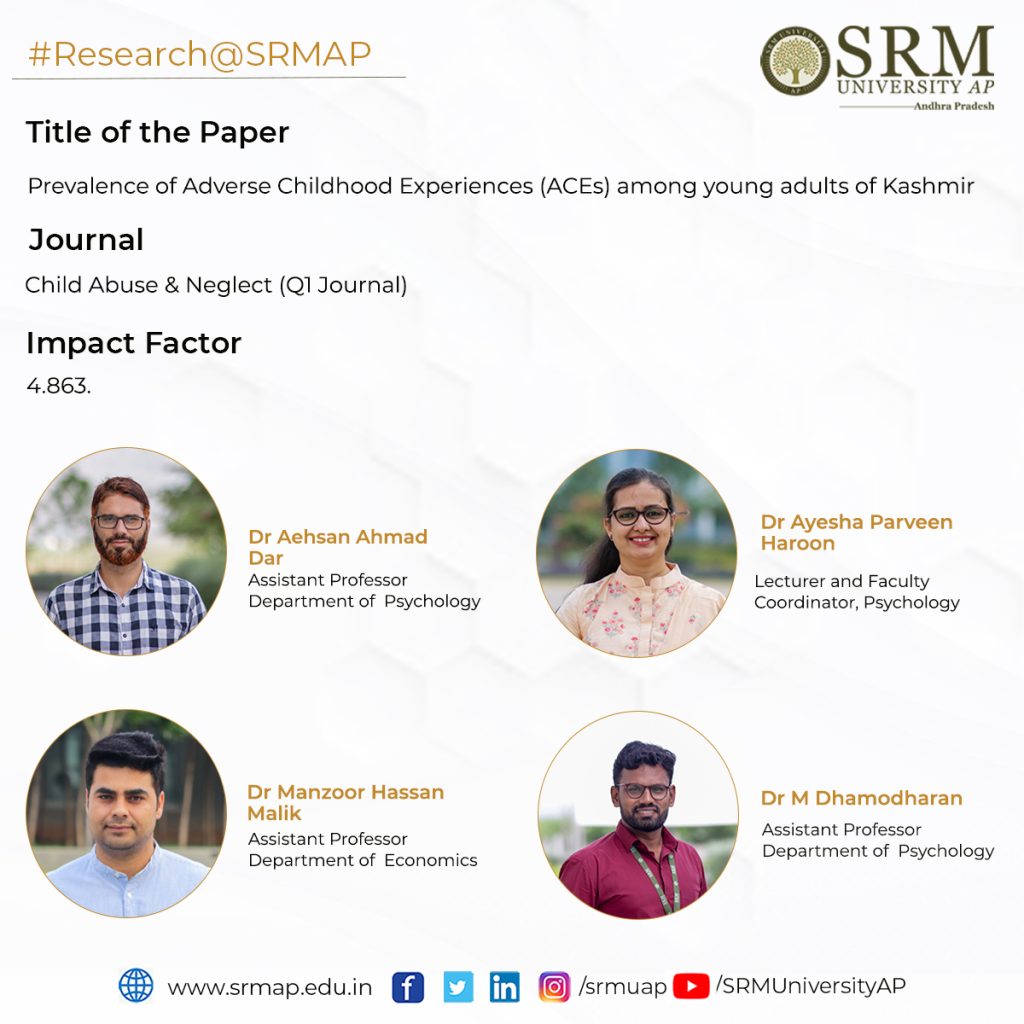
The Faculty of Psychology and Economics have jointly published a paper titled “Prevalence of Adverse Childhood Experiences (ACEs) among young adults of Kashmir” in the Q1 Journal Child Abuse & Neglect, having an impact factor of 4.863. Dr Aehsan Ahmad Dar, Assistant Professor, Department of Psychology; Dr Manzoor Hassan Malik, Assistant Professor, Department of Economics; Dr Ayesha Parveen Haroon, Lecturer, Department of Psychology; Dr Dhamodharan M, Assistant Professor, Department of Psychology have worked on interpreting the emotional constraints that are harboured among the young adults experiencing the adversities in turbulent Kashmir.
Abstract
The present study estimated the prevalence of ACEs among young adults studying in the colleges and universities of Kashmir, India. Findings disclosed that 15.4 % of the students reported high exposure to ACEs, 13.4% of the participants reported high exposure to ACEs, 26.3 % of the sample reported moderate exposure to ACEs, 33.0 % of the youth reported low exposure to ACEs and 11.8 % of the respondents reported no exposure to ACEs. The prevalence of ACEs was found to be 88.2 % (females: 82.7 % and males: 90.8 %) with a mean of 4.72 adverse events during childhood. The ACEs with the highest level of prevalence were “often or very often insulted or put down” (49.8 %), followed by “often or very often hurt physically” (47.6 %), “often or very often pushed, grabbed, or slapped” (41.6 %), “lived with a mentally ill household member” (28.3%), “touched or sexually fondled” (25.3 %),” household member being into the prison” (25.0%) and “witnessed father or mother being pushed, grabbed, slapped, or had something thrown at them” (24.0%).
Practical Implementation of the Research
The findings of the study will serve as a reliable source for healthcare professionals, policymakers and NGOs to better understand the impact of ACEs on the health and well-being of individuals. Since ACEs are associated with several immediate and long-term health hazards, therefore, necessary efforts in this direction are suggested to advocate the early targeted intervention to reduce ACEs and their impact as well as design effective measures to improve the health and well-being of young adults, thereby reducing the development of physical and mental disorders.
Collaborations
- Prof. Sibnath Deb, Rajiv Gandhi National Institute of Youth Development, Sriperumbudur, Tamil Nadu, India.
- Dr Manzoor Hassan Mali, Department of Economics, SRM University-AP, Andhra Pradesh, India
- Prof. Waheeda khan, Department of Clinical Psychology, Faculty of Behavioural Sciences, Shree Guru Gobind Singh Tricentenary University, Budhera, Gurugram, Delhi-NCR, India.
- Dr Ayesha Parveen Haroon, Department of Psychology, SRM University-AP, Andhra Pradesh, India
- Dr Amra Ahsan, Department of Clinical Psychology, Faculty of Behavioural Sciences, Shree Guru Gobind Singh Tricentenary University, Budhera, Gurugram, Delhi-NCR, India
- Dr Farhat Jahan, Department of Clinical Psychology, Faculty of Behavioural Sciences, Shree Guru Gobind Singh Tricentenary University, Budhera, Gurugram, Delhi-NCR, India
- Dr Bushra Sumaiya, Faculty of Education, Shree Guru Gobind Singh Tricentenary University, Budhera, Gurugram, Delhi-NCR, India.
- Shaheen Yawar Bhat, Department of Physiology, All India Institute of Medical Sciences, New Delhi, India.
- Dr Dhamodharan M, Department of Psychology, SRM University-AP, Andhra Pradesh, India
- Mohamad Qasim, Independent Researcher
The research cohort plans to study youth’s mental health and ascertain its risk and protective factors. About 19% of the world’s children live in India, which constitutes 42% of the total Indian population, and nearly half of these children are vulnerable and need care and protection. Due to various traumatic experiences, stress has increased among young people resulting in various physical and mental disorders.
The research will focus on the pathogenic (post-traumatic stress disorder, depression, anxiety, somatisation) and salutogenic (post-traumatic growth and resilience) consequences of trauma to help the youth withstand adverse experiences and develop psychological competence. The research will provide insights into the mental health of youth that would be helpful for the administration, policymakers, and other voluntary organisations to understand effective ways to devise and implement the best intervention programs for maximising mental health protective factors and minimising its risk factors.

